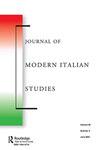The Fascist view of the ‘allogeni’ in the border regions
IF 0.7
3区 历史学
Q1 HISTORY
引用次数: 0
Abstract
ABSTRACT The Fascist policy towards linguistic minorities has sometimes been compared to that practised in the colonies, using the categories of racism and internal colonialism. According to some interpretations, Fascism considered members of minorities as something foreign, potentially hostile, if not actually inferior, starting from a clear dividing line between who could be considered Italian and who not. It has also been argued that the ‘allogeni’ were the first targets of radical measures to exclude them from Italian citizenship, the forerunners of the later racist laws implemented against colonial subjects and Jews. This article has three aims: to verify whether severe discriminatory actions really were taken against members of linguistic minorities with regard to citizenship rights; to understand whether these persons were perceived as completely alien to the nation on the basis of clear, shared demarcation lines between those who could consider themselves Italian and those who could not; and, finally, to determine whether the view of such minorities was always radically negative and disdainful to the extent that it could justifiably be called racism. The analysis of forms of representation focuses in particular on the German-speaking population of South Tyrol, using various sources (newspapers, institutional correspondence, political speeches, literary accounts). The answer to the first question posed is negative; as regards the other two, in the first place there is a considerable degree of uncertainty on the part of the Fascists in defining the members of the German-speaking minority, who were sometimes presented as being completely outside the perimeter of Italianità, i.e. Italianness, while more often as being on the margins but undoubtedly capable of integration thanks to their unshakably Italian core. This seems to reveal a certain difficulty in defining who could be considered Italian and who could not when clearly drawing the boundaries of Italianness. Secondly, judgements were made about the South Tyroleans that were in no way characterized by a lack of appreciation or by contempt. The descriptions of the South Tyrolean peasant are, to say the least, flattering: full of exaggerated praise for his many virtues, from his religiosity to his obedience to institutions, from his strong ties to the land to his conservatism. The views regarding the Slovenian and Croatian-speaking populations of Venezia Giulia and Istria were very different, expressing and amplifying the most scornful stereotypes of anti-Slavism developed during the national struggles of the nineteenth and twentieth centuries.法西斯主义者对边境地区“异体人”的看法
摘要法西斯主义对语言少数群体的政策有时被比作殖民地的政策,使用种族主义和内部殖民主义的类别。根据一些解释,法西斯主义认为少数民族成员是外国的,如果不是真正的劣势,也可能是敌对的,这是从谁可以被视为意大利人和谁不能被视为意大利人之间的明确分界线开始的。也有人认为,“异教徒”是将他们排除在意大利公民身份之外的激进措施的第一个目标,是后来针对殖民地臣民和犹太人实施的种族主义法律的先驱。该条有三个目的:核实在公民权利方面是否真的对语言少数群体成员采取了严重的歧视行动;了解这些人是否被视为与这个国家完全陌生,因为那些可以认为自己是意大利人的人和那些不能认为自己是意大利人的人之间有着明确、共同的分界线;最后,确定这些少数群体的观点是否总是极端消极和轻蔑,以至于有理由称之为种族主义。对代表形式的分析特别关注南蒂罗尔的德语人口,使用各种来源(报纸、机构通信、政治演讲、文学报道)。对提出的第一个问题的回答是否定的;关于其他两个,首先,法西斯在定义德语少数民族成员时存在相当大的不确定性,他们有时被认为完全不在意大利的范围内,即意大利性,而更多的时候是处于边缘,但由于他们坚定不移的意大利核心,无疑能够融合。这似乎揭示了在明确划定意大利的界限时,界定谁可以被视为意大利人,谁不能被视为意大利人存在一定的困难。第二,对南蒂罗尔人的判决决不是缺乏欣赏或蔑视。至少可以说,对这位南蒂罗尔农民的描述是奉承的:对他的许多美德充满了夸张的赞扬,从他的宗教信仰到他对制度的服从,从他与土地的牢固联系到他的保守主义。对威尼斯朱利亚和伊斯特里亚的斯洛文尼亚人和克罗地亚人的看法截然不同,表达并放大了十九世纪和二十世纪民族斗争中形成的反斯拉夫主义最轻蔑的刻板印象。
本文章由计算机程序翻译,如有差异,请以英文原文为准。
求助全文
约1分钟内获得全文
求助全文
来源期刊

Journal of Modern Italian Studies
Multiple-
CiteScore
1.00
自引率
25.00%
发文量
66
期刊介绍:
The Journal of Modern Italian Studies (JMIS) is the leading English language forum for debate and discussion on modern Italy. This peer-reviewed journal publishes five issues a year, each containing scholarly articles, book reviews and review essays relating to the political, economic, cultural, and social history of modern Italy from 1700 to the present. Many issues are thematically organized and the JMIS is especially committed to promoting the study of modern and contemporary Italy in international and comparative contexts. As well as specialists and researchers, the JMIS addresses teachers, educators and all those with an interest in contemporary Italy and its history.
 求助内容:
求助内容: 应助结果提醒方式:
应助结果提醒方式:


